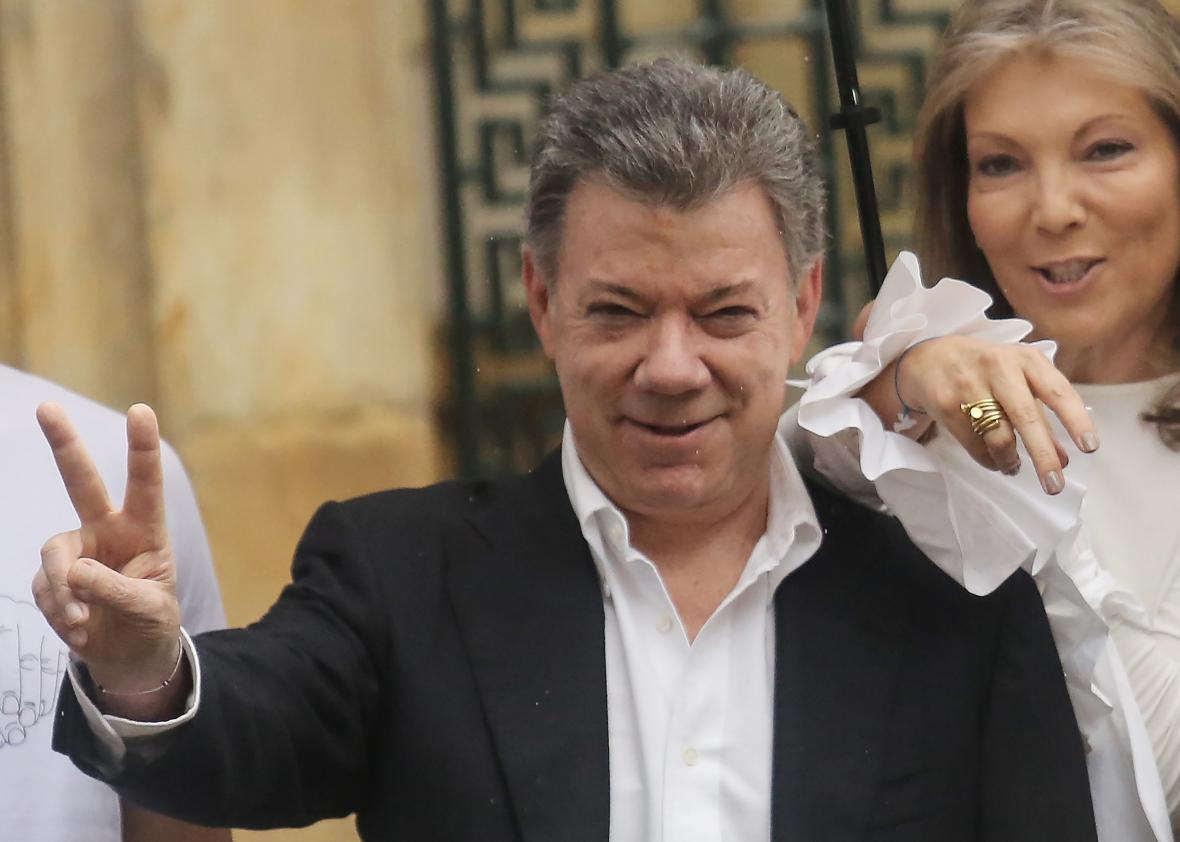The Norwegian Nobel Committee has thrown some curveballs over the past decade, with prizes for Barack Obama in 2009 and the European Union in 2012, but this year’s award to President Juan Manuel Santos for his work to end the long-running conflict in Colombia, just days after voters narrowly rejected the peace agreement he had negotiated, is still a head-scratcher.
Santos had been a front-runner for the award for the landmark peace deal, but the committee’s final decision isn’t made until October and Nobel-watchers generally assumed that the failed referendum had knocked him out of the running. The committee notably did not have Santos share the award with FARC commander Rodrigo “Timochenko” Londono. In past awards given in recognition of peace deals, the leaders of both sides have typically been awarded, but an award to Timochenko would have enraged the Colombians who see the deal as too lenient to a group responsible for decades of kidnappings and bombings.
The committee’s statement credits Santos with having “initiated the negotiations that culminated in the peace accord” and for “ensuring that Colombian voters were able to voice their opinion” on it, even if the result wasn’t what he wanted. They say:
The fact that a majority of the voters said no to the peace accord does not necessarily mean that the peace process is dead. The referendum was not a vote for or against peace. What the “No” side rejected was not the desire for peace, but a specific peace agreement.
The fact that de facto peace has been achieved in Colombia after decades of violence is, indeed, a remarkable achievement. Despite the result last week, the parties have returned to the negotiating table and a resumption of armed conflict seems very unlikely. Many of the FARC guerrillas have already turned in their weapons.
But still, making peace isn’t just about sitting down with your enemies, it’s about bringing your supporters along with you. And Santos plainly failed to do that. He was overconfident that voters would approve the deal he had reached with the FARC, insisting on a plebiscite when there was no legal requirement for one, and treating the accord like a fait accompli in the days leading up to the vote, which likely suppressed turnout among supporters. Even if full-scale conflict won’t resume, the vote was a setback to achieving lasting peace and stability.
The committee makes it clear that the award is as much about an aspiration for peace, as a recognition of past accomplishments:
By awarding this year’s Peace Prize to President Juan Manuel Santos, the Norwegian Nobel Committee wishes to encourage all those who are striving to achieve peace, reconciliation and justice in Colombia. The president himself has made it clear that he will continue to work for peace right up until his very last day in office. The Committee hopes that the Peace Prize will give him strength to succeed in this demanding task.
Maybe. With fraught efforts to renegotiate the deal ongoing and election-season soon to get underway in Colombia, the president’s prize could also polarize the country’s politics even further. Just ask Obama how helpful that 2009 prize has been. Awarding Santos now isn’t going to make the FARC, or critics of the deal within the government, any more likely to work with him. (I pity whoever had to break the news this morning to former President Alvaro Uribe, Santos’ former mentor turned rival and leading opponent of the agreement.) I suggested Thursday that an elegant solution to this problem would be to give the award to the victims’ groups who have campaigned for peace, rather than Santos or Timochenko. Perhaps the committee had already decided Santos was getting it before the referendum failed?
Giving the peace prize to Santos is simply premature and not particularly helpful. As we were reminded last week by the obituaries for Shimon Peres, who shared the 1994 prize with Yasser Arafat and Yitzhak Rabin “for their efforts to create peace in the Middle East,” over time these awards can come to symbolize the failures of diplomacy as much as its achievements.
